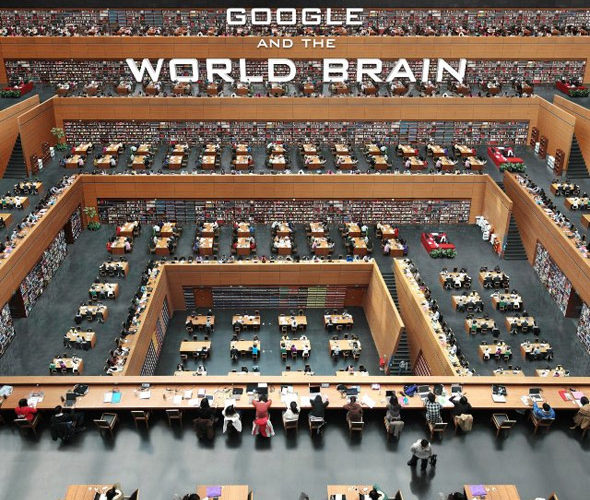H.G. Wells, famed sci-fi author, serves as a central thematic reference in the paranoid conspiracy documentary Google and the World Brain. The core concept from Wells, borrowed as a metaphor for today’s modern era conundrum, is that of the World Brain, an abstract explanation for the consolidation of all humanity’s recorded thoughts into one single contained unit. In many ways, you can look at this abstraction as something that has come to fruition with the advent of digital information in the internet era and in the face of Google’s omnipresence in that space. Specifically, director Ben Lewis is interested in exposing the dark underbelly of Google’s global mission to spread information to everyone, because one corporation controlling all that data could actually be very dangerous.
This sentiment of fear is achieved to varying degrees of success by contrasting Google’s most ambitious project to date, the complete digitization of every book in the world, with interviews from a variety of esteemed technologists, lawyers and librarians. Code named ‘Project Ocean’ for the vast magnitude of data that would be digitized, the idea originated early on for Google CEOs Larry Page and Sergei Brin and falls in line with their overall mantra to make information more easily accessible. Several massive public libraries (including Harvard) were initially eager to participate in the program because it would essentially be opening its physical doors to the digital global unconsciousness. The extreme costs and man hours involved in scanning each book page by page seemed impossible, but Google, who had been developing new technology to make the process easier, footed all costs for access to this valuable data in hopes of making Google Books the de-facto place for people to read online.

However, Google did not just scan books in the public domain, but also works that were still protected by copyright without permission from the original authors, claiming it was a case of fair use. It’s this uncharacteristic move by Google that raises questions about their intentions. Combine this with a penchant for intruding on the privacy of its users, and you too should be worried that the search engine might be evolving into a big brother entity. The argument being, whoever controls the data can ultimately monopolize said data and become a singular gatekeeper with the ability to divulge that information to whoever they decide to share it with. While a frightening thought to consider, it’s also a bit hyperbolic to make such accusations with the crutch of the argument still being mostly speculative.
While director Ben Lewis does an admirable job of gathering informative talking heads to flesh out the theories about what Google could really be up to, there is an undeniable quality of the documentary that revels in the sense of villainy. From the creepy techno music, to the abrupt cuts of accusatory text, the cinematic style gives off the effect of an online conspiracy video. Still, there are enough fascinating nuggets of information to keep things moving and make you more skeptical of privacy in technology. Google and the World Brain is a fascinating, yet uneven, examination of the dangers of the digital age if we as a society become too complacent with our technology.


